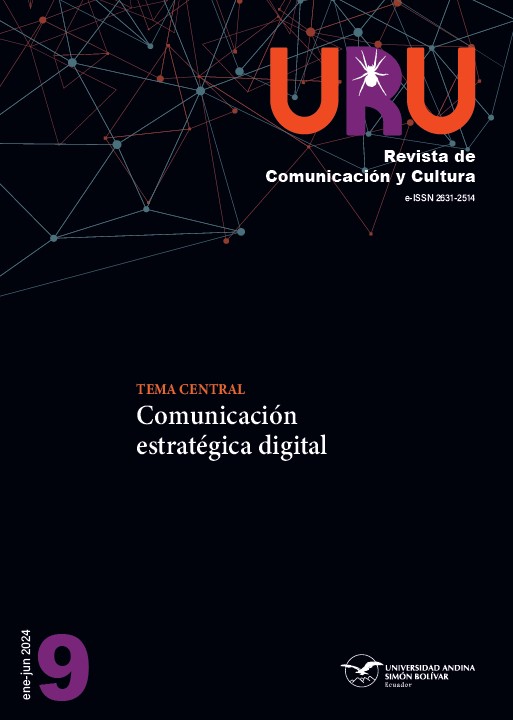How is Digital Communication Positioned in Independiente del Valle?
DOI:
https://doi.org/10.32719/26312514.2024.9.3Keywords:
Soccer, social media, Independiente del Valle, brand position, digital reputationAbstract
Independiente del Valle burst into Ecuadorian professional soccer in 2007 with a mission: to do things differently. Today, 16 years later, the team is a national and regional benchmark on how to manage a club from a business and disruptive perspective, in a complex and conventional industry such as football. “A different club” is the slogan used by the team in their messages on social networks. Through the following pages, the intention is to show how the Ecuadorian club adopted new paths and approaches to be different. Institutionally, in sports and in the ways of communicating and positioning itself as a brand.
Downloads
References
Amabile, Teresa, y Michael Pratt. 2016. “The Dynamic Component Model of Creativity and Innovation in Organizations: Making Progress, Making Meaning”. Research in Organization Behavior 36: 157-83. https://bit.ly/3J8YLvR. DOI: https://doi.org/10.1016/j.riob.2016.10.001
Ballesteros, Carlos. 2021. “La interacción con las redes sociales de los clubes españoles de fútbol”. Index Comunicación 11 (1): 11-33. https://doi.org/10.33732/ixc/11/01Lainte. DOI: https://doi.org/10.33732/ixc/11/01Lainte
Campos, Pablo. 2021. “Estadio, redes, ciencia. IDV, un club diferente. IDV, un campeón diferente”. Suplemento comercial de Chubb Seguros para Independiente del Valle.
Carrión, Fernando. 2017. “El fútbol coloniza el espacio social”. En ¿Quién raya la cancha? Visiones, tensiones y nuevas perspectivas en los estudios socioculturales del deporte en Latinoamérica, coordinado por Rodrigo Soto y Omar Fernández, 337-54. Buenos Aires: CLACSO. DOI: https://doi.org/10.2307/j.ctv253f53v.25
Costa, Joan. 2018. “Creación de la imagen corporativa: El paradigma del siglo XXI”. Razón y Palabra 22 (1_100): 356-73. https://tinyurl.com/yn72h2d4.
Del Fresno, Miguel. 2012. El consumidor social: Reputación online y social media. Barcelona: Universitat Oberta de Catalunya.
Deportes&Finanzas. 2022. “Reporte América”. Ko-fi. https://ko-fi.com/deporfinanzas.
Díaz, Javier. 2023. Investigar la brecha digital, las noticias y los medios: Hacia la equidad informativa digital. Barcelona: Profesionales de la Información. https://doi.org/10.3145/digidoc-informe8 DOI: https://doi.org/10.3145/digidoc-informe8
Fernández, Ana, Iván Puentes y Montse Vázquez. 2019. “Gestión de la comunicación en las competiciones deportivas regulares: Fútbol sala, voleibol, baloncesto y balonmano en España”. Retos 36: 9-16. https://doi.org/10.47197/retos.v36i36.66658. DOI: https://doi.org/10.47197/retos.v36i36.66658
Gantman, Marcelo. 2022. El final del deporte como lo conocimos: Fanáticos, consumos y performance en la era de la tecnología y el big data. Buenos Aires: Marcelo Gantman.
Hernández Sampieri, Roberto, y Christian Mendoza. 2020. Metodología de la investigación: Las rutas cuantitativa, cualitativa y mixta. Ciudad de México: McGraw-Hill.
Kotler, Philip, y Kevin Keller. 2012. Dirección de marketing. Ciudad de México: Pearson.
Marca90. 2023. “Gran estreno #ElTEAMxMARCA90 Invitado de Lujo, #BetoAlfaroMoreno”. Video de YouTube. https://tinyurl.com/7exd5s4c.
Olabe, Fernando. 2014. “Entre el ‘publicity’ y la gestión comunicativa integral: El caso del Fútbol Club Barcelona”. Anduli. Revista Andaluza de Ciencias Sociales 13: 75-94. http://dx.doi.org/10.12795/anduli.2014.i13.05. DOI: https://doi.org/10.12795/anduli.2014.i13.05
Piñuel, José Luis, y Jérôme Ferret, coord. 2016. E-reputación: La construcción de la reputación online y su vulnerabilidad. Salamanca, ES: Comunicación Social.
Ricci, Patricio. 2020. “Una revisión general sobre la creatividad”. Revista Científica Arbitrada de la Fundación MenteClara 5. https://doi.org/10.32351/rca.v5.201. DOI: https://doi.org/10.32351/rca.v5.201
Ries, Al, y Jack Trout. 2002. Posicionamiento: La batalla por su mente. Ciudad de México: McGraw-Hill.
Rivera, Enrique. 2021. “La construcción de la pasión por el fútbol: El caso de los Leones Negros de la UdeG”. Culturales 9. https://doi.org/10.22234/recu.20210901.e597. DOI: https://doi.org/10.22234/recu.20210901.e597
Sanahuja, Guillermo. 2012. “Análisis de los procesos en la comunicación corporativa de los clubes deportivos profesionales españoles: Estudio exploratorio”. AdComunica 3: 171-89. https://doi.org/10.6035/2174-0992.2012.3.11. DOI: https://doi.org/10.6035/2174-0992.2012.3.11
Vaquero, Alicia. 2012. “La reputación online en el marco de la comunicación corporativa: Una visión sobre la investigación de tendencias y perspectivas profesionales”. AdComunica 3: 49-63. http://dx.doi.org/10.6035/2174-0992.2012.3.4. DOI: https://doi.org/10.6035/2174-0992.2012.3.4
Downloads
Published
How to Cite
Issue
Section
License
Copyright (c) 2024 Uru: Revista de Comunicación y Cultura

This work is licensed under a Creative Commons Attribution-NonCommercial-ShareAlike 4.0 International License.
ASSIGNMENT OF RIGHTS, DECLARATION OF CONFLICT OF INTEREST AND DISSEMINATION
The authors who publish in this journal accept the following conditions:
- Authors retain copyright and grant the journal the right of first publication, with the work registered under the Creative Commons Attribution-NonCommercial-ShareAlike 4.0 License, which allows sharing, adapting and attributing the work (see: Open Access Policies).
- Authors can make other independent and additional contractual agreements for the distribution of the article published in this journal (e.g., include it in an institutional repository or publish it in a book) as long as they expressly indicate that the article was published for the first time in Uru: Revista de Comunicación y Cultura. In the case of reproduction, a note similar to the following must be included: This text was originally published in the journal Uru: Revista de Comunicación y Cultura N ° -, year of publication.
- Authors are encouraged to publish their work on the Internet (e.g. on institutional or personal pages) in the final version published by Uru: Revista de Comunicaicón y Cultura as it may lead to a wider and faster dissemination of the published work.








